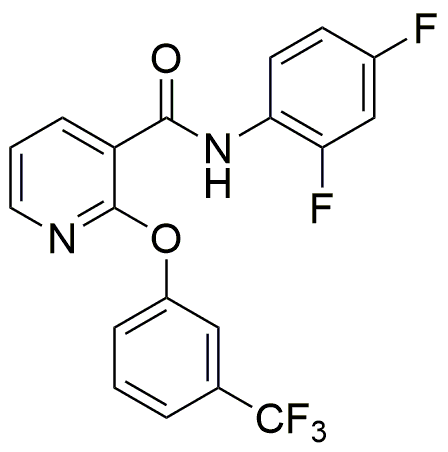Diflufenican is widely utilized in research focused on:
- Agricultural Herbicide: It is primarily used as a selective herbicide in various crops, effectively controlling a wide range of broadleaf weeds while minimizing damage to cereal crops.
- Environmental Studies: Researchers employ diflufenican to study its environmental impact and behavior in soil and water, helping to assess its safety and efficacy in agricultural practices.
- Pesticide Formulations: It serves as a key ingredient in pesticide formulations, providing enhanced weed control compared to traditional herbicides, which can lead to improved crop yields.
- Resistance Management: The chemical is used in developing integrated weed management strategies, helping to combat herbicide-resistant weed populations effectively.
- Research on Plant Physiology: Scientists utilize diflufenican to investigate its effects on plant growth and development, contributing to a better understanding of plant responses to herbicides.
Informations générales
Propriétés
Sécurité et réglementation
Applications
Diflufenican is widely utilized in research focused on:
- Agricultural Herbicide: It is primarily used as a selective herbicide in various crops, effectively controlling a wide range of broadleaf weeds while minimizing damage to cereal crops.
- Environmental Studies: Researchers employ diflufenican to study its environmental impact and behavior in soil and water, helping to assess its safety and efficacy in agricultural practices.
- Pesticide Formulations: It serves as a key ingredient in pesticide formulations, providing enhanced weed control compared to traditional herbicides, which can lead to improved crop yields.
- Resistance Management: The chemical is used in developing integrated weed management strategies, helping to combat herbicide-resistant weed populations effectively.
- Research on Plant Physiology: Scientists utilize diflufenican to investigate its effects on plant growth and development, contributing to a better understanding of plant responses to herbicides.
Documents
Fiches de données de sécurité (FDS)
La FDS fournit des informations de sécurité complètes sur la manipulation, le stockage et l’élimination du produit.
Spécifications du produit (PS)
Le PS fournit une description complète des propriétés du produit, notamment sa composition chimique, son état physique, sa pureté et les exigences de stockage. Il détaille également les plages de qualité acceptables et les applications prévues du produit.
Certificats d'analyse (COA)
Recherchez des certificats d'analyse (COA) en saisissant le numéro de lot du produit. Les numéros de lot et de lot se trouvent sur l'étiquette d'un produit, après les mots « Lot » ou « Lot de fabrication ».
Numéro de catalogue
Numéro de lot/série
Certificats d'origine (COO)
Ce certificat d'exploitation confirme le pays dans lequel le produit a été fabriqué, et détaille également les matériaux et composants utilisés et s'il est issu de sources naturelles, synthétiques ou autres sources spécifiques. Ce certificat peut être requis pour les douanes, le commerce et la conformité réglementaire.
Numéro de catalogue
Numéro de lot/série
Fiches de données de sécurité (FDS)
La FDS fournit des informations de sécurité complètes sur la manipulation, le stockage et l’élimination du produit.
DownloadSpécifications du produit (PS)
Le PS fournit une description complète des propriétés du produit, notamment sa composition chimique, son état physique, sa pureté et les exigences de stockage. Il détaille également les plages de qualité acceptables et les applications prévues du produit.
DownloadCertificats d'analyse (COA)
Recherchez des certificats d'analyse (COA) en saisissant le numéro de lot du produit. Les numéros de lot et de lot se trouvent sur l'étiquette d'un produit, après les mots « Lot » ou « Lot de fabrication ».
Numéro de catalogue
Numéro de lot/série
Certificats d'origine (COO)
Ce certificat d'exploitation confirme le pays dans lequel le produit a été fabriqué, et détaille également les matériaux et composants utilisés et s'il est issu de sources naturelles, synthétiques ou autres sources spécifiques. Ce certificat peut être requis pour les douanes, le commerce et la conformité réglementaire.


